When cable TV was just getting started in the mid-to-late 1970’s, many of the locally based providers of that once-revolutionary but now commonplace service were friendly mom and pop businesses that tried their hardest to take care of their customers while also offering them an astonishing variety of viewing choices.
With those smaller operations now totally absorbed by absurdly large mega-corporations like Comcast, Cox and Charter Communications, though, attentiveness to their subscribers’ needs and affordable prices for their channel lineups are practically foreign concepts to the bottom-line minded heads of those enormous companies.
Thus, with their tentacles, er…wires extending all the way to phone, Internet and even home security services, today’s telecommunications monoliths seemingly don’t know how to satisfy their constantly frustrated clientele, or how to make their miserable employees’ thankless jobs anywhere near tolerable.
Screenwriter W. Scott Hunter was one of those frustrated cable company worker bees, having seen and felt for himself how his co-workers and customers alike were subjected to the careless and cruel attitudes of one gargantuan TV provider (which shall remain nameless). Thankfully for fans of workplace comedy, Hunter’s many memories of his eventful time in cable TV service have inspired a hilarious new series called, simply enough, The Cable Company.

Danny Ross stars as Mark, the easily overwhelmed head of the customer service department at a humongous cable TV provider in the new comedy web series THE CABLE COMPANY.
Created by Hunter and now streaming on YouTube, The Cable Company‘s first season (made up of four short episodes) offers a humorous look at the activities – or lack thereof – of the four eclectic staff members of a giant Texas-based cable company’s customer service department.
The show co-stars Danny Ross as Mark, the hapless supervisor in charge of said department and overseer of employees like the carefree Nicole (played by Elitia Daniels, who also directed the series), driven overachiever Alison (Julia Tilden) and quiet subordinate Timothy (Alex Pike).
Originally written as a half-hour sitcom pilot before Hunter transformed the series into four micro-length webisodes, The Cable Company is based primarily on Hunter’s exasperating post-college years working for a local cable TV franchise owned by a larger, out of town conglomerate. During that time, Hunter’s aggravation with the company’s contempt for its customers and employees was as palpable as his powerlessness to improve his working environment.
As Hunter notes, though, those same problems can be found in any big corporation, and the disappointments he experienced at work would soon be channeled (no pun intended) into the comedic world of The Cable Company. “I’m trying to convey a lot of frustrations as a corporate employee (through the show). I’ve found a lot of similarities between several different jobs, where incompetence, borderline corruption, and nepotism is rampant. There is often a severely outdated software system that drags everything down, as well.”
Since quitting his cable TV job, Hunter has become one of the millions of “cord cutters” who’ve switched to streamers like Amazon Prime, Hulu and Netflix. Unfortunately, he and his fellow ex-cablers still experience the same subpar service that comes with getting phone and Internet capabilities provided to them by – you guessed it – the cable company. Those experiences are also satirized in Hunter’s series.
“Your install window is hours if not all day, you never seem to get the speed you pay for, you constantly have to do some weird reset sequence to get your router to work halfway, and you get exorbitant fees tacked on at their discretion. Most of that makes no sense to you as a customer. Most of it makes no sense to you as an employee. I will say that I do understand the install window issue, but it doesn’t make it any less frustrating as a customer.”
In creating the show’s quartet of harried cable company employees, Hunter considered the similarities that they – and he – shared with the show’s protagonists. “As far as developing the characters, they generally start out as a composite of several people you’ve known in real life, plus elements of yourself,” Hunter replies. “That then gets exaggerated and molded into sitcom archetypes, and if possible you layer in contradictions for each character. Then the actors add their own interpretation. In the end you hopefully have something that’s both unique and universal.”

Elitia Daniels (who also directed THE CABLE COMPANY) plays Nicole, an easygoing customer service rep at the local cable company.
Daniels’ portrayal of Nicole is a combination of comic exaggeration and identifiable qualities found in the eclectic employees of businesses large and small, including those she’s shared office space with in the past.
However, as she indicates, her feelings toward the easygoing character she plays are as different as the real life manner she exudes. In fact, it’s similar to another of The Cable Company‘s main personalities – but with a more gentle side to it.
“I’m actually probably more like Alison in a work environment – but nicer, I promise! However, I’ve always been a little jealous of people like Nicole, who can take work a little less seriously and are less worried about making good impressions all the time. I think Nicole is definitely an exaggerated version – (because) comedy – but it was important for me to make her as earnest and honest as possible.”
As high production costs forced Hunter to restructure The Cable Company from half-hour sitcom into a short form web series, Hunter realized that he couldn’t effectively transform the scenes from his full-length pilot into brief, 90 second-to-two minutes long webisodes. Thus, Hunter decided to restart the scripting process from square one.
“…I ended up creating new scenes that resemble the sketch format. A lot of sitcom scenes follow the sketch format, to a degree, although usually with less absurdism,” Hunter explains. “My intention (for the series) was to create standalone sitcom scenes that would quickly introduce the premise of a small local cable company, and introduce the main characters.”
As the first outbreak of COVID-19 decimated the United States in March 2020, Hunter’s plans for producing the series were immediately put on hold, but when The Cable Company‘s future co-star Danny Ross began a digitally based search for writers and actors to participate in a virtual table read of the show’s pilot episode, the goal of assembling its brilliant cast would ultimately be realized.
“Productions were shut down and auditions had stopped (in Los Angeles), so Danny Ross posted on Reddit looking for writers to do Zoom table reads,” remembers Hunter. “He brought on the rest of the cast to read the full pilot and things progressed from there to the web series production.”
Delighted by their performances during the table read, and prepared to see their work recorded for posterity during filming, Hunter praises the talented performers he collaborated with on The Cable Company. “The entire cast (of The Cable Company) is great. Thankfully, I saw the (Reddit) post, and thankfully, Elitia was also a director.”
Daniels, in turn, praises Hunter’s thorough work in creating and developing The Cable Company‘s characters and story arcs. “I really appreciate Scott’s attention to comedic detail in his characters,” she replies. “As a writer and producer, Scott is very collaborative – which is amazing – and he knows what he wants, which I love.”

Alex Pike co-stars in THE CABLE COMPANY as the customer service department’s rather humble yet lowly-ranked employee Timothy.
After adjusting the typically in-person casting process to be a virtual one during the pandemic, Hunter and his newly assembled ensemble cast took on an even tougher challenge: filming all four episodes of The Cable Company while carefully taking steps to ensure the physical safety of his on-set personnel.
“While this was a non-union shoot, we followed the union guidelines as closely as possible,” recalls Hunter. “Everyone was tested 24-48 hours before the shoot, it was a closed set, and the crew wore masks at all times. We had extra masks available, as well as multiple sanitizer dispensers. Only the cast went without masks while shooting scenes.”
Even though the short lengths of each episode allowed Hunter’s cast and crew to finish shooting the series in only one day, their comprehensive pre-production medical preparations allowed for filming to go off without a hitch. So too did the exterior accoutrements provided to them outside the set. “We also had the luxury of an outdoor patio area and nice weather that allowed for the cast to prep and spend time between scenes outside,” adds Hunter. “We also ate lunch outside.”
For Daniels, who also directed the series, being behind the camera was part film school/part comedy masterclass. “Directing The Cable Company was a wonderful experience,” she says.. “I had such a good time exploring how to use timing and the camera’s POV (point of view) to enhance the comedy. As an actor/director, my favorite part is working with other actors, but being behind the camera also helped me crack the pace and tone for this show.”
While not on-camera as Nicole, Daniels scoped out every shot and actor blocking situation during scenes involving the show’s other three characters. “We did run-through rehearsals in the space, where I talked through what the shots would be with Corey (Parsons, our director of photography) and Scott to make sure we were all on the same page,” Daniels recalls.
When playing Nicole, Daniels’ attention to cinematic detail was also in evidence both before and after filming. “For Nicole’s episodes, I would sometimes have someone stand-in for me while we worked out the shots, but once we were rolling, we’d do it a few times before I’d watch playback. While I was juggling acting and directing, I put a lot of trust into Corey, Scott and the team to tell me if something wasn’t working.”

Completing THE CABLE COMPANY’s four person ensemble cast is Julia Tilden, who plays the cable company’s determined Type-A customer service rep Alison.
Though Hunter’s series explores previously uncharted territory for a workplace-based ensemble sitcom – in this case, the customer service department of a humongous cable TV company – the quirky aspects of its office-bound characters and the all-too-common struggles they face while on the job are things that audiences of The Cable Company have almost certainly experienced in their own lives.
“The Cable Company should appeal to anyone who likes comedy television and sitcoms,” Hunter says. “While the specific setting is unique, the main thing that distinguishes it from other workplace sitcoms is the characters. While they have some universal characteristics, their specific qualities will hopefully feel fresh and appeal to anyone and make them laugh. If we can layer in some situations that are specific to a cable company, that will hopefully be fun and interesting for anyone watching.”
“I love that Scott has created characters that all believe in their hearts that they’re made for something greater, deserve more, or are too good for the situation they’re in – but somehow can’t find a way to move on or improve their lives,” adds Daniels. “We all feel that way a little and we all hope to be the one that finds a way to do something meaningful with our life. The steady paycheck trap can be so easy to fall into – and one day you wake up and realize you’ve been working at a terrible cable company for 5 years.”
Cord cutters, cable TV subscribers and working stiffs in all industries (including cable TV) are definitely going to find lots to laugh about – and to ponder – when they watch The Cable Company. “I mainly hope that (the show) makes people laugh. I hope they can relate to it as people, as anyone who’s ever had a job, and as customers of cable companies,” says Hunter. Daniels adds: “I hope we make people laugh! That’s pretty much it. I would love to have as many people watch and smile as possible.”
NOTE: Hunter says that all four episodes of The Cable Company will be closed-captioned.
Watch season 1 of The Cable Company on YouTube:
https://www.youtube.com/playlist?list=PLRTBr2zuEYiNp1Xv1amMQYc0JAJnBRetl
INSTAGRAM: @CableCoShow
TWITTER: @CableCoShow

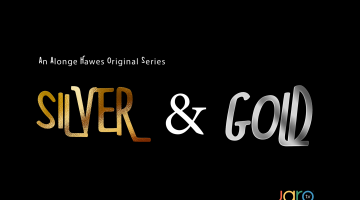



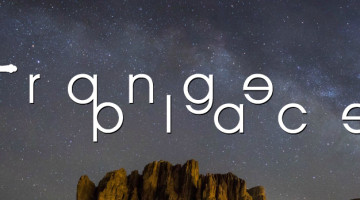
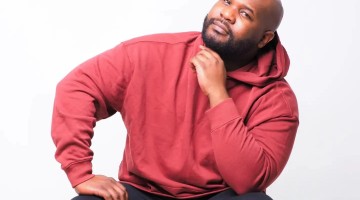
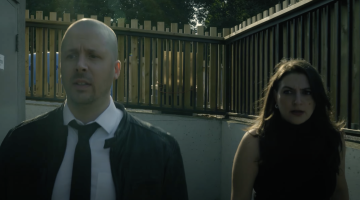
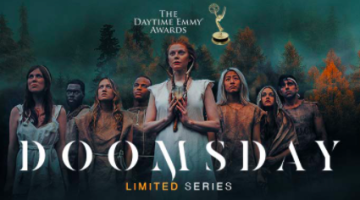

No Comment